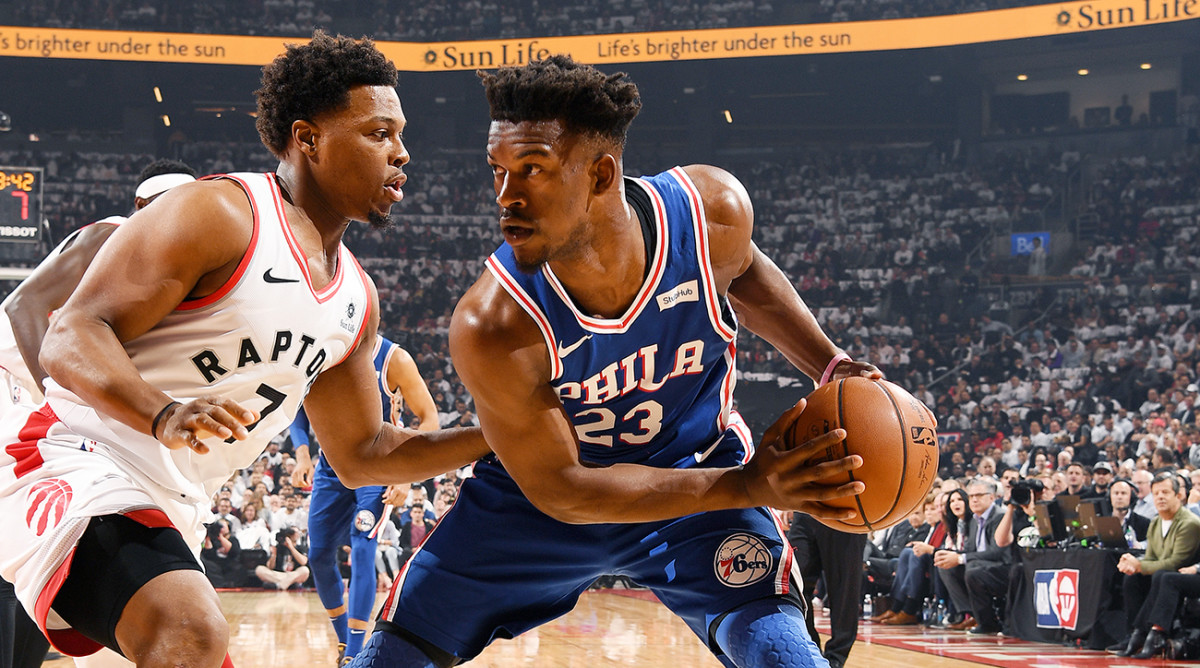That's the Jimmy Butler the Sixers Need

Late in the third quarter, as the Raptors whittled a 13-point Philly lead down to two points, the Sixers hadn't hit a field goal in almost four minutes. The Toronto crowd was losing its mind and breaking into Kawhi Leonard MVP chants. All of this was setting up for a collapse so demoralizing that it would almost certainly be the end of the Sixers season. That's when Jimmy Butler took the basketball, walked it up court, and lowered his shoulder around Norman Powell, a Jonah Bolden screen, and Kawhi Leonard's help defense. He absorbed contact from Powell at the rim, got the foul, laid in a runner off the glass, and hit the ensuing free throw. The Sixers had some breathing room again.
Butler made some version of that play—manufacturing offense out of nowhere, answering a Raptors run, keeping the Sixers alive—about five times in Game 2 on Monday. He finished with 30 points, 11 rebounds, and five assists in a 94-89 win, but his game wasn't as elegant as that line makes it sound. Most of his offense came on threes, free throws, or grinding drives that ended with points in the lane. Butler finished 9-22 from the field. What made the night great was that almost every shot he made came at a time when the Sixers had run out of alternatives.
"This was James Butler," Brett Brown said afterward. "Like, that was the adult in the gym. He was just a tremendous, tremendous rock. He willed us. He was a stud."
Butler, about 20 minutes later, corrected his coach on his given name. "My name isn't James," he said. "It is literally Jimmy." That Butler answer followed Joel Embiid, who had just finished telling a reporter that "if you've had the s---s before" then you'd know how he felt pregame, when he was dealing with gastrointestinal problems that left him recuperating with an IV.

The whole night was perfectly bizarre and chaotic for a team that has made those qualities its trademark. First there was the pregame news that Embiid would be a game-time decision, but this time it wasn't about the knee problems. Then there was Greg Monroe coming out of nowhere and supplanting Furkan Korkmaz and Boban Marjanovic in the rotation to help carry the Sixers in the first half. Then it was James Ennis hanging around for 24 minutes and providing 13 points and useful wing defense off the bench. There was also Ben Simmons playing 41 minutes, most of which were spent shadowing Kawhi wherever he went. As a team the Sixers turned the ball over 13 times while amassing a 13-point lead in the first half. Then they nearly gave that lead away in the third quarter, built another double-digit lead in the fourth, and then survived a one-possession game in the final minute.
"If you looked at the first half," Brown said, "And you said, '13 turnovers in the first half, 10 in the second period. In Toronto, in the Eastern Conference semifinals, Game 2.' What would you guess the score would be? You certainly wouldn't think you were winning, and you'd bet that they would have 70, because they run so well. And so, if you eliminate the turnovers, which they had 18 points off [of], and you look at the score, they had 38 points. I was proud of our defense."
Defense is what Butler focused on as well. "We get stops," he said, "and we're taking off into the open floor. Guys are making plays, like Jo and Ben. Whenever we're playing like that, guarding like that, we're such a good team." As he added of the rest of the rest of the series: "As long as we get back, guard, and rebound, don't turn the ball over, we'll be alright."
It should be noted that Kawhi remains an absolute maniac in this matchup. In Game 2, even with Simmons successfully denying him the ball and making his life much harder than it was Game 1, and even with the Sixers sending sporadic double teams throughout the game, Kawhi finished with 35 points (13-24 shooting), seven rebounds, and six assists. He's going to be a problem for the entire series, and the Raptors were four points better than the Sixers with Kawhi on the floor Monday.
But Kawhi can't do everything, and as the game unfolded in Toronto, anyone paying attention was reminded that this series isn't necessarily as one-sided as it seemed after Game 1. For one, Toronto's bench on Monday looked every bit as thin as Phildelphia's did on Saturday—the Raptors got five points on 2-11 shooting from Fred VanVleet, Norman Powell, Jodie Meeks, and Serge Ibaka. Among the starters, Marc Gasol gave them excellent defense on Embiid, but nothing on offense. Kyle Lowry hit shots at the very end, but he wasn't great for most of the game. Danny Green wasn't knocking down shots. Pascal Siakam had 21 points, but his 12-15 shooting in Game 1 gave way to a 9-25 night in Game 2.
The game became a rock fight for both teams, and that's where the Sixers want to be. "When you shrink your rotations," Brown said afterward, "it's naive for us to think you're going to play the game like a track meet. It's a fist fight. It's a grind."
The Sixers have no alternative but to play ugly and hope to drag the Raptors down with them. Toronto has spent the past six months surrounding Kawhi with low-usage shooters and secondary playmakers, all of whom double as great defenders, creating a balanced attack on both ends of the floor. Philly is the team that runs 75 dribble hand-offs for J.J. Redick, has no idea where to put Ben Simmons, and starts roughly one-third of its possessions with Joel Embiid pump-faking from the three point-line and slowly crashing his body into a lane full of help defenders. They have the chemistry of an All-Star team, but one that technically only has two All-Stars. Even when everything is working great—at +34.0, the Sixers starting five has one of the best net-ratings of any lineup in the playoffs—it's a complicated situation.
Against Toronto, the offense will be even trickier. Kawhi can take away most of what Simmons wants to do on that end, while Gasol has done a great job limiting Embiid, who may not even be healthy. To win this series, the Sixers are going to need someone else to keep them afloat. That's Butler's job. He only had 10 points in Game 1 and spent long stretches of Saturday night looking painfully ordinary next to Kawhi. The Sixers need him to be much better.
If Butler can help carry the on offense and the rest of this team can defend, there's a chance for Philly's talent to beat Toronto's balance at the end of these games. Embiid, for instance, was great in the final minutes of Game 2. He'd struggled all night, but when it mattered, he found Butler with a perfect cross-court pass for a wide-open three. Then, with 24 seconds left, he put the Sixers up three as he rolled to the rim and spun his way into a lay-up in the middle of Gasol, Siakam, and Leonard. For the first time all night, the Raptors looked helpless against him.
Plays like that could be the story of the series for Embiid. He'll struggle to match his regular season numbers against Gasol and Toronto's swarming help defense, but on big possessions at the end of games, he can still scare the hell out of the Raptors. The same could be true for Simmons as a cutter and Harris and Redick as shooters. They’re all dangerous as secondary options; they just need someone who can keep the team alive as option one.
Butler personifies the Sixers better than anyone on the roster right now. He hasn't been as good as he was supposed to be when he arrived in Philadelphia, he's about to be incredibly expensive this summer, his game is uglier than most of his elite peers, and it's easy to look at where he is this season and predict that all of this is going to end badly. That's what the whole world was doing after Game 1. Then Game 2 arrived and we saw the other half of the equation: Butler is still big, crazy talented, and relentless enough to make life miserable for anyone trying to beat him.
Any Sixers conversation on the internet tends to be freighted with years of arguments and resentments over the way this team was conceived. Almost every week there's a new referendum on whether The Process worked, whether it was executed properly, or lately, whether Elton Brand and the new management team have botched its aftermath. And obviously, if the 29-year-old Butler and his complicated value is the best metaphor for the Sixers, that may not be the most encouraging sign for the long-term outlook here. At the same time, I'm not sure anyone in Philadelphia needs to be worried about the future at the moment.
All that mattered Monday is that the Sixers went into Toronto and came back with home-court advantage. The Raptors are still favored to win the series, and they should be. Toronto has the best player on either team and the tools to neutralize the two most talented players on the other side. But if Butler can continue to deliver, that narrows the gap, and this could get interesting. As the old saying goes, a playoff series doesn’t start until Joel Embiid has gastrointestinal issues, Brett Brown calls his superstar by the wrong name, and everyone begins to rethink everything they thought they knew after Game 1.
